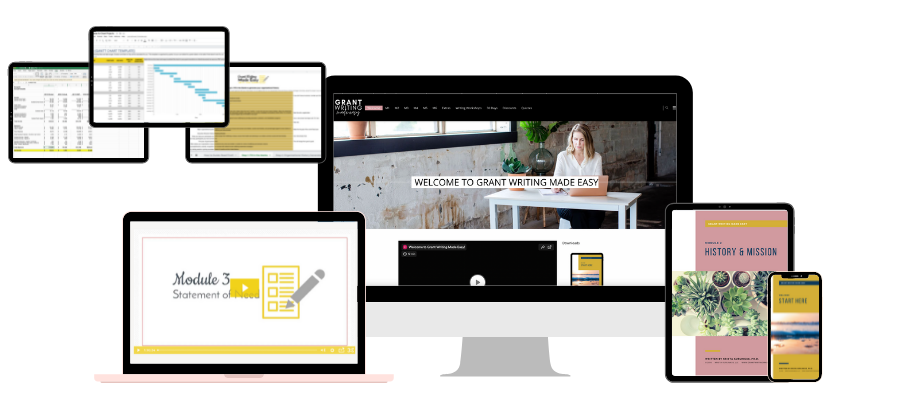Almost everyone knows that grant funding for nonprofit organizations is out there. In fact, there are grants for nearly every cause, including grants for artists, educators, and local governments. Yet, the process of finding and applying to these grants is often shrouded in mystery.
Before I go into the details of how to find grant opportunities, it is important to understand what grants really are. People often describe grants as free money. While this is true for certain types of grants, like scholarships, this could not be further from the truth in the nonprofit world.
Grants are a type of funding that foundations, agencies, and other institutions give to organizations to further their own missions. That last part of the sentence is key.
Organizations don’t get grants simply because they are doing good work. Nonprofits get grant funding because their good work aligns with the end goals of the funder.
Performing your grant search with this in mind will help you narrow down your search to only the grants that your organization qualifies for.
What is a Grant Evaluation?
Finding grants is easy. The grant evaluation process is when the real work begins.
A grant evaluation is a thorough research process to figure out if a grant opportunity is a good fit for your nonprofit.
During this stage, you will read through as much information you can about the grantmaker, their guidelines, and the type of programs they typically fund.
You can gather this information from the following sources:
- The grantmaker’s website
- The grant application
- The grantmaker’s 990 form (This is publicly available information and can be found through a quick Google search)

The Most Important Factors to Consider When Evaluating a Grant Opportunity
Timeline
Grants fall into two categories. Rolling grants accept applications throughout the year. However, proposals may be reviewed by the foundation or agency one to four times a year.
If you come across a grant with a rolling deadline, take advantage of this and give yourself at least four weeks to pull together an application. In the meantime, you can reach out to the foundation or agency and build rapport.
Other grants have hard deadlines. In this case, consider the complexity of the application to determine if your organization has enough time to put a competitive application together. I personally prefer a lead time of 2 to 4 weeks for foundation and at least 8 weeks for government grants. If hitting the deadline would mean cutting it close, write to the grantmaker to see if there will be any available grants later in the year.
Funder Focus
Grantmakers usually have very specific guidelines for the types of organizations and programs they will fund.
After you have compiled a list of grants your organization qualifies for, review the grant guidelines to determine if your organization is a close match to the funder’s priorities.
Broad Guidelines
Location: The majority of foundations prioritize organizations working in their own communities. However, there are also grantmakers that specifically fund international nonprofits.
Project area: Grants may be restricted to organizations that focus on single missions, such as K-12 education, healthcare, or ending homelessness.
Specific Guidelines
Project type: Funders will describe the type of projects they prefer to fund. Some grantmakers will not fund capital projects that include building construction or the purchase of expensive equipment. Others will only provide restricted funding for a specific project.
Organization size: Some grantmakers prefer smaller nonprofits with lower budgets. Others mainly fund large institutions with millions of dollars in revenue. Review past grantees to determine if your organization has a similar financial profile.

How to Find Grants Opportunities For Your Nonprofit
Your grant search should start online. There are several ways to filter through opportunities.
The Best Websites to Find Grants
Google – Search engines like Google are amazing for finding grant opportunities. A very basic search would include the keywords your location + grant funding. Due to the influx of COVID-specific grants, searching COVID19 relief grants + your location can also yield useful results.
If you become familiar with search engine operators (I go in depth into operators in the How to Find and Evaluate Grants workbook), you will be able to perform even more refined searches.
Instrumentl – This is a grantmaker database that allows you to search through foundations that give grants by their focus areas or location. You can perform a basic search for free, or get a subscription plan starting at $149 dollars a month.
GrantStation: GrantStation has a robust grant search platform that contains grantmakers from around the world. If you sign up for a paid membership, you can save your search terms and grantmakers.
Candid (Formerly Foundation Directory and GuideStar): Like Instrumentl, Candid allows you to do a preliminary grant search for free. You can also use this site to learn more about grantmakers, such as their average award amount and past 990 tax forms.
US/State Agencies: Government grants are usually allocated by specific agencies, such as the Department of Education, USAID, or State-level agencies.
You can find lists of government grants on these agencies’ official websites. You can also sign up for the agency’s newsletter to receive information about new requests for proposals directly to your inbox.
Other Ways to Find Grant Funding Sources
Nonprofit Social Media Networks
Executive directors and other nonprofit staff often pass on opportunities they come across, but do not qualify for. Connecting with other nonprofit professionals through social media groups on LinkedIn and Facebook can give you a leg up on new grant opportunities.
Corporate Funding
Many large companies, including retailers, banks, and construction firms have a grantmaking arm. Start with businesses that operate in your local area. If you cannot find information about their charitable activities on their website, send an email or a direct message on social media.
So you’ve followed this advice and now you have a list of viable grant opportunities? Congratulations!
If you are looking for guidance on the rest of the application process, consider joining Grant Writing Made Easy, my comprehensive, self-paced online course that will help you learn and implement the skills needed to write successful grants.
In addition to six comprehensive learning modules, you’ll have access to the private, members-only Facebook group with more than 1,000 like-minded grant writers. As a member of GWME, you also will receive a discount for $50 to Instrumentl and a discount to get annual access to GrantStation for just $99.
If you’re ready to join, click the button below, and I’ll see you inside! Or, save the link until you’re ready:







